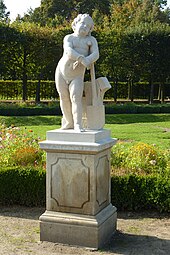Phlegmatic

As a phlegmatic (via Latin phlegmaticus , "suffering from an abundance of phlegm, phlegmatic, snotty; snotty, phlegmatic, who suffers from an excess of damp and cold body juice", from ancient Greek φλέγμα phlégma , German 'fire, embers, slime, phlegm' ) describes a person who is slow, calm, and sometimes even cumbersome.
The phlegmatic forms with the choleric , the sanguine and the melancholic the four temperaments of the medieval temperament theory on the basis of the humoral pathology which has existed since antiquity (four juices doctrine). In the four-juices theory, which was used from antiquity to the early modern period, phlegm is the body juice with moist and cold primary quality.
The phlegmatic is often accused of indolence or lack of animation. In a positive sense, he is also described as peace-loving, orderly, reliable and diplomatic.
According to Aristotle , a phlegmatic is inadequate from an ethical point of view and therefore morally inferior. Because with regard to the human sensation of anger, the phlegmatic does not follow the morally virtuous path of the middle , which expresses itself in a calm but determined behavior, but the extreme of the insufficient. This position behaves just as wrongly according to the choleric person who has succumbed to the opposite extreme, hot anger . Aristotle expressed this view in his important work Nicomachean Ethics in the context of the definition of an ethical virtue ( arete ). For them it is important to always find the right center in relation to oneself in relation to one's own actions and feelings. The phlegmatic is far from this right center with his behavior and thus behaves in a morally un virtuous way, following Aristotelian ethics.

According to Eysenck , the phlegmatic temperament is characterized by the combination of emotional stability with introversion .
According to Oskar Hausdörfer (1864–1951), the top priority of a stuttering person must be to become a phlegmatic, because he always keeps his nerves stable and then does not watch his speech anxiously to see whether he would be able to cope with the current situation.
The development of a person's character traits is, however, judged more differently by today's personality psychology ; Many factors are involved in their formation, but the humoral pathology is refuted.
See also
Web links
swell
- ↑ Jürgen Martin: The 'Ulmer Wundarznei'. Introduction - Text - Glossary on a monument to German specialist prose from the 15th century. Königshausen & Neumann, Würzburg 1991 (= Würzburg medical-historical research. Volume 52), ISBN 3-88479-801-4 (also medical dissertation Würzburg 1990), p. 160.
- ↑ Konrad Goehl : Guido d'Arezzo the Younger and his 'Liber mitis'. Königshausen & Neumann, Würzburg 1984 (= Würzburg medical-historical research. Volume 32), Volume 1, p. 101 and more often (on phlegm ), and Volume 2, p. 664 (on phlegmaticus ).
- ^ Hausdorfer Instituut voor Natuurlijk Spreken: Over Oscar Hausdörfer. In: Hausdörfer Stuttering Therapy. Retrieved April 2, 2019 (nl-NL).
- ↑ Christine Michaela Busle: Stuttering, modification techniques and therapy options. Analysis of case studies from a linguistic perspective. (PDF) 2002, accessed on April 2, 2019 (Dissertation ( https://d-nb.info/967342902/34 )).